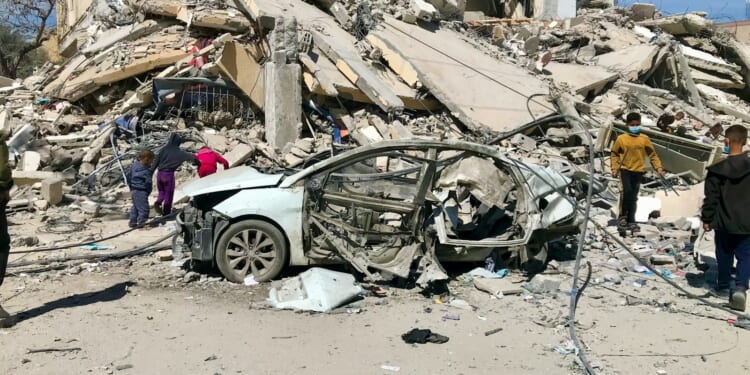Garvan Walshe is a former national and international security policy adviser to the Conservative Party.
You’ve got to feel for the man.
Once talked of as a president of Europe, his career horizons have narrowed to administrator of the Gaza International Transitional Authority. As though he invaded Iraq because he hoped to be Paul Bremer when he grew up.
The Authority Tony Blair has been bruited to head would be tasked with the complete reconstruction of a territory laid waste by war with no support from the belligerents on whom US President Donald Trump hopes to impose a peace.
This war started, we would do well to remember, two years ago, when Hamas sent several thousand men rampaging across the border with Israel, attacking villages and kibbutzim, murdering, raping and taking more than 200 Israelis hostage.
They were able to carry out the massacre because Israel had left the border lightly defended. Partly because the extremist coalition partners of Israeli Prime Minister Benjamin Netanyahu were stirring up trouble in the West Bank, so more forces had to be moved there to keep a lid on any Palestinian reaction; and partly because Hamas had deceived the Israelis into concluding that the billions of dollars that Netanyahu allowed in from Qatar was a bribe to keep them quiet, not funds with which to plan a major attack.
Israel responded with expected ferocity: a huge bombing campaign that destroyed lots of buildings, killed tens of thousands of Gazans but failed to achieve either of its military objectives: to destroy Hamas, or force it to give up the hostages.
Because Hamas, which had governed the strip, adopted the entirely predictable strategy of fighting as insurgents, hiding among and beneath the civilian population. Under the law of war this is a serious war crime — your enemy is supposed to avoid targeting your civilians, but in exchange you must not use your own civilian population as a shield. The destruction of Palestinian life is, in international law, something for which Israel and Hamas share blame rather more equally than Israel’s growing number of detractors assert.
Yet even if international law is set aside there are only two ways to eliminate an insurgency that operates working a civilian population within a confined territory: establish a more effective government than the insurgents, thus depriving them of legitimacy, or getting rid of the civilian population (the third way: to separate the civilian population from the insurgents as used by the British in the Boer War and Malaya, is only effective against rural insurgencies). The first was ruled out by Netanyahu’s coalition partners who want to conquer Gaza, not help anti-Hamas politicians establish a government there. The second is difficult to distinguish from a crime against humanity.
Though it was unable to get Netanyahu to agree to a “political horizon” (the Israeli euphemism for a Palestinian state), the Biden administration forced him to adhere to certain basic requirements of international law, including providing humanitarian aid, it couldn’t get him to sacrifice his coalition partners, and ultimately his job to make a deal. Instead he fired his Defence minister Yoav Gallant and gambled that Trump would win and a Trump administration would give him a free hand.
His bet appeared to pay off when Trump posted his AI generated “Gaza Riviera” video imagining a future Mediterranean resort city from which the original population had somehow been…removed.
But something changed Trump’s mind. It was probably not the international outcry at Israel cutting off humanitarian aid (this likely was given at least and amber light by Washington) or the European countries recognising Palestine as a state.
Some in the Administration may have asked basic questions about the plan: where are all these people to go? How are they actually to be sent there, without provoking suffering so severe that Egypt, despite the Sisi regime caring so little about Palestinians that it too operates a blockade of Gaza from the south, being forced by public opinion to intervene militarily, or Saudi Arabia, despite such indifference, being forced to finance it?
Such interventions would not have to be successful to cause Washington to back off.
The oil price spike a major Middle East war would cause is one of the few things known to concentrate Trump’s mind. The other is money. This has been supplied by Qatar, which has publicly bribed Trump with a luxury plane. It hosts the Hamas leadership and wasn’t best pleased when Israel bombed them last month.
So Trump turned the pressure on, forcing Netanyahu to at least publicly acquiesce to negotiations with Hamas and the eventual creation of a new governing authority to rebuild Gaza. The Israeli army, which has opposed the latest invasion of Gaza city, halted operations with almost indecent haste.
Negotiations will take some time.
Nobody is better at sabotaging Israeli-Palestinian peace negotiations than Netanyahu, who has made preventing lasting peace between the two peoples his life’s work. But his coalition partners’ dream, that from the river to the sea, the land of Israel will be Palestine-free, is over.









![Florida Officer Shot Twice in the Face During Service Call; Suspect Killed [WATCH]](https://www.right2024.com/wp-content/uploads/2025/12/Inmate-Escapes-Atlanta-Hospital-After-Suicide-Attempt-Steals-SUV-Handgun-350x250.jpg)

![Trump, Hegseth to Get Troops Paid Despite Dems Voting Against it Eight Times [WATCH]](https://www.right2024.com/wp-content/uploads/2025/10/Trump-Hegseth-to-Get-Troops-Paid-Despite-Dems-Voting-Against-350x250.jpg)





